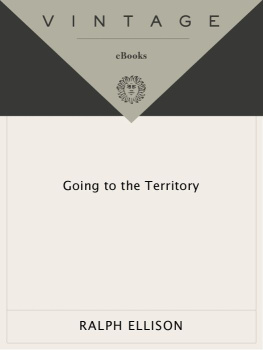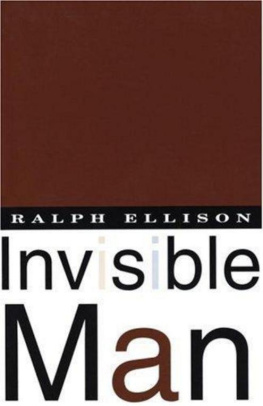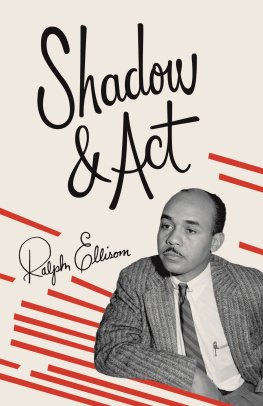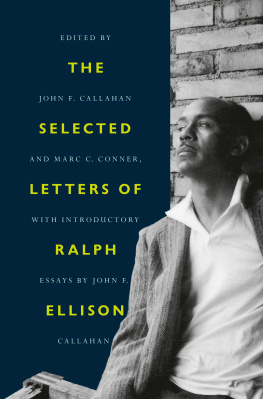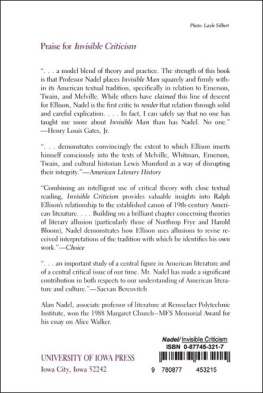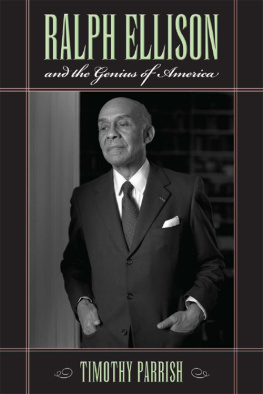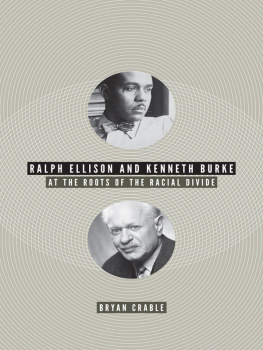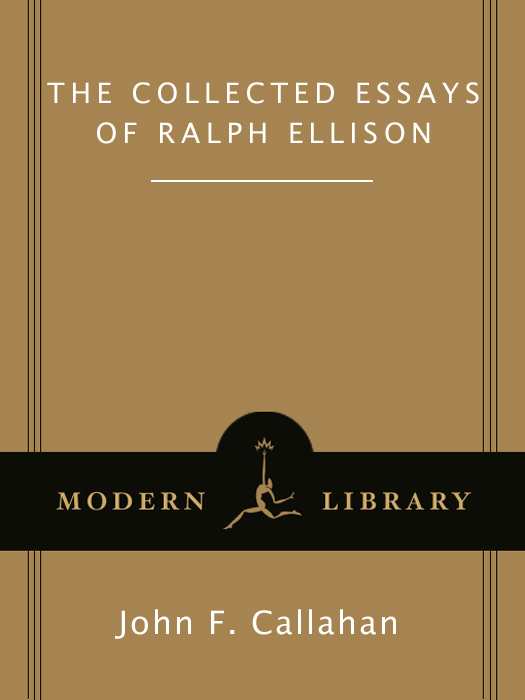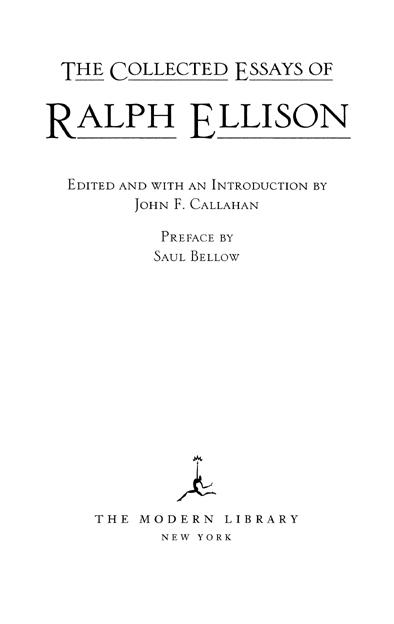2003 Modern Library Paperback Edition
Biographical note copyright 1994 by Random House, Inc.
Preface copyright 1995 by Saul Bellow
Introduction copyright 1995 by John F. Callahan
All rights reserved under International and Pan-American Copyright Conventions. Published in the United States by Modern Library, an imprint of The Random House Publishing Group, a division of Random House, Inc., New York, and simultaneously in Canada by Random House of Canada Limited, Toronto.
Portions of this work have been previously published in Shadow and Act and Going to the Territory. Additionally, some of the essays were previously published in Saturday Review, New Masses, The Nation, The Atlantic, The Harvard Advocate, The New York Times Magazine, and Callaloo.
This work was originally published in hardcover by Modern Library, an imprint of The Random House Publishing Group, a division of Random House, Inc., in 1995.
LIBRARY OF CONGRESS CATALOGING-IN-PUBLICATION DATA
Ellison, Ralph.
[Selections. 1995]
The collected essays of Ralph Ellison/edited by John F. Callahan; preface by Saul Bellow.Modern Library ed.
p cm.
eISBN: 978-0-307-79702-5
1. Ellison, RalphAuthorship. 2. Afro-Americans in literature.
3. Afro-AmericansCivilization. I. Callahan, John F. II. Title
PS3555.L625A6 1995
814.54dc20 95-4719
Modern Library website address: www.modernlibrary.com
v3.1
RALPH ELLISON
Ralph Waldo Ellison was born in Oklahoma City, Oklahoma, on March 1, 1914. His father was a construction foreman and later the owner of a small ice-and-coal business who died when his son was three. Ellison and his younger brother, Herbert, were raised by their mother, who worked as a nursemaid, janitress, and domestic, and was active in politics. As a child he was drawn to music, playing trumpet from an early age and studying classical composition at Tuskegee Institute under the instruction of William L. Dawson. Of his musical influences he later said: The great emphasis in my school was upon classical music, but such great jazz musicians as Hot Lips Page, Jimmy Rushing, and Lester Young were living in Oklahoma City. As it turned out, the perfection, the artistic dedication which helped me as a writer, was not so much in the classical emphasis as in the jazz itself.
In July 1936, after his junior year at Tuskegee, Ellison went to New York to earn money for his senior year and to study sculpture, and stayed. In June 1937 his friendship with Richard Wright began and led him toward becoming a writer. Ellison also made the acquaintance of Langston Hughes and the painter Romare Bearden, among others. From 1938 until World War II he worked on the New York Federal Writers Project of the WPA. Starting in the late 1930s, he contributed reviews, essays, and short fiction to New Masses, Tomorrow, The Negro Quarterly (of which he was for a time managing editor), New Republic, Saturday Review, Antioch Review, Reporter, and other periodicals. During the war he served in the Merchant Marine, and afterward he worked at a variety of jobs, including freelance photography and the building and installation of audio systems.
Over a period of seven years Ellison wrote Invisible Man, which was recognized upon its publication in 1952 as one of the most important works of fiction of its time. It was on the bestseller list for sixteen weeks and won the National Book Award. Its critical reputation and popularity have only grown in the more than four decades since its publication. Although an excerpt from a second novel was published in Noble Savage in 1960, and seven other selections in various literary magazines between then and 1977, no other long work of fiction has yet appeared under Ellisons name. Shadow and Act (1964) and Going to the Territory (1986) collect essays and interviews written over more than forty years.
From 1955 to 1957 Ellison was a fellow of the American Academy in Rome. Returning to the United States, he taught and lectured at a wide range of institutions including Bard College, the State University of New York at Stony Brook, the University of Chicago, Rutgers, Harvard, Brown, and Yale. He was awarded the Presidential Medal of Freedom in 1969; the Chevalier de lOrdre des Arts et Lettres in 1970 by the French Minister of Culture, Andre Malraux; and the National Medal of Arts in 1985. He was a charter member of the National Council on the Arts and Humanities, and from 1970 to 1979 was Albert Schweitzer Professor in the Humanities at New York University.
After a brief first marriage Ellison married Fanny McConnell in 1946; for more than forty years, until his passing on April 16, 1994, they lived on Riverside Drive in Harlem.
Posthumous editions of Ellisons work, edited and with an introduction by John F. Callahan, include The Collected Essays of Ralph Ellison (1995), Flying Home and Other Stories (1996), and Juneteenth (1998), each published by Random House, Inc.
ACKNOWLEDGMENTS
I wish to acknowledge the generous help of several persons. My research assistant, Adam Francis Bradley, was diligent, dedicated, and efficient gathering Ellisons published articles from various journals and magazines. Nathan A. Scott, Jr., William R. Kenan Professor Emeritus of Religious Studies and Professor Emeritus of English at the University of Virginia, spotted and suggested felicitous corrections to errors in the first editions of Shadow and Act and Going to the Territory. The late Leon Forrest, novelist and professor of English and African American studies at Northwestern University, perceptively responded to queries concerning unpublished essays and speeches. Robert G. OMeally, Zora Neale Hurston Professor of English and Comparative Literature at Columbia University, opened his abundant files, provided a tape and transcription of Ellisons 1971 speech honoring William L. Dawson, and offered helpful suggestions about possible sequences for the essays.
I am more indebted than I can say to Mrs. Fanny Ellison. She endured and aided my perusal of her late husbands files and papers, and, as Ralph Ellisons best reader, she shared indispensable information and insight about the composition and context of previously uncollected or unpublished writing.
PREFACE
Saul Bellow
R ALPH E LLISON , who died last year at the age of eighty, published only one novel in his lifetime.
In 1953 at a Bard College Symposium dinner attended by foreign celebrities, Georges Simenon, who sat at our table, asked Ellison how many novels he had written, and when he learned that there was only one he said, To be a novelist one must produce many novels. Ergo, you are not a novelist.
The author of hundreds of books, writing and speaking at high speed, was not in the habit of pausing to weigh his words. Einstein, a much deeper thinker, had said in reply to a sociable ladys question about quantum theory (why, under such and such conditions, was there only one quantum?), But isnt one a lot, madam?
In Ralphs case it certainly was a lot. Simenon remains readable and enjoyable, but Inspector Maigret is finally like an overly exploited mine. Novels in the suspense genre developed by Simenon can be considered as the chapters of a single fat novel. Maigret belongs to a large family of cops or private eyes, geniuses of detection like Sherlock Holmes or the heroes of Dashiell Hammett, Raymond Chandler, et al. These gifted men worked honorably at the writers trade. Ellison did no such thing. He had a calling, not a trade and what we witness in


